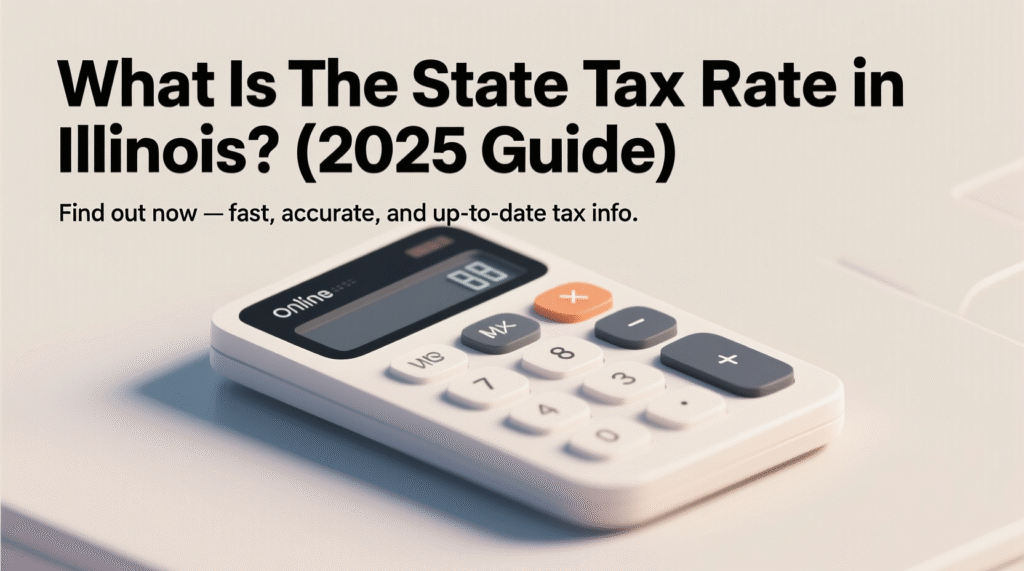
Quick Answer
Illinois has a flat individual income tax rate of 4.95% for residents and nonresidents earning income in the state.
- Corporate income tax: 9.5% (includes the replacement tax).
- State sales tax: 6.25% base rate, with local taxes raising it up to about 11% in some cities.
- Property taxes: Among the highest in the U.S., averaging around 1.95% of a home’s value.
Understanding Illinois Income Taxes
Flat Income Tax: 4.95%
Unlike states with progressive brackets, Illinois uses a single flat rate. Whether you make $40,000 or $400,000, your income is taxed at 4.95%. This makes filing straightforward, but some argue it places more pressure on middle-income households.
Retirement and Investment Income
Illinois is considered retiree-friendly because Social Security, pensions, 401(k), and IRA distributions are not taxed. Investment income such as dividends or capital gains, however, is subject to the flat 4.95%.
Corporate and Business Taxes
Businesses pay a combined 9.5% corporate income tax, which includes the Personal Property Replacement Tax.
- Partnerships and S-corps: additional 1.5% replacement tax
- Corporations: additional 2.5% replacement tax
This makes Illinois one of the higher-tax states for businesses compared with neighbors like Indiana or Wisconsin.
Sales and Other Taxes
State and Local Sales Tax
The base sales tax is 6.25%, but local governments can add their own rates. In Chicago, for example, the total sales tax can reach 10.25%–11%, one of the highest in the nation.
- Groceries: Lower rate (1%) applies.
- Prescription drugs and medical appliances: Generally exempt.
- Digital goods and streaming services: Chicago applies an “amusement tax,” often called the Netflix tax.
Property and Excise Taxes
- Property tax: Illinois homeowners pay an average of 1.95% of a property’s value each year, nearly double the U.S. average.
- Excise taxes: Cigarettes ($2.98 per pack) and gasoline (42.7 cents per gallon plus sales tax).
How Illinois Compares to Other States
- Income tax: Lower than California’s top bracket (13.3%) but higher than zero-income-tax states like Texas and Florida.
- Corporate tax: Illinois’s 9.5% is above the U.S. average of ~6%.
- Sales tax: Among the highest when local rates are factored in.
A quick comparison:
| State | Individual Income Tax | Corporate Income Tax | Sales Tax (avg.) |
|---|---|---|---|
| Illinois | Flat 4.95% | 9.5% | 6.25–11% |
| Indiana | Flat 3.05% | 4.9% | 7% |
| Wisconsin | 3.54–7.65% (progressive) | 7.9% | 5–6% |
| Texas | None | 0% (Franchise tax applies) | 6.25–8.25% |
Who Pays and How It Works
Residents vs. Nonresidents
Illinois has reciprocal agreements with Iowa, Kentucky, Michigan, and Wisconsin. If you live in one of these states and work in Illinois, you usually only pay income tax to your home state.
Example Scenarios
- Single filer making $60,000: owes about $2,970 in Illinois income tax.
- Small business owner (S-Corp): pays 4.95% personal income tax plus 1.5% replacement tax.
- Retiree: owes no state tax on Social Security or pension income, only on other taxable income.
Why the Illinois Tax Structure Matters
Illinois residents face one of the highest overall tax burdens in the country, with income, property, and sales taxes combined. While the flat rate simplifies filing, it also means the tax load isn’t adjusted for lower-income households.
For policymakers, the debate continues: should Illinois stick with its flat tax or consider a progressive model? For taxpayers, the reality is clear—planning around sales, property, and excise taxes is just as important as income tax.
FAQs
Is Illinois’s income tax flat or progressive?
Flat, at 4.95% for all income levels.
Does Illinois tax retirement income?
No. Social Security, pensions, and distributions from IRAs and 401(k)s are exempt.
What is the corporate tax rate in Illinois?
9.5%, including the replacement tax.
What is the highest sales tax in Illinois?
Chicago’s rate can reach around 11%.
Does Illinois tax groceries?
Yes, but at a reduced 1% rate.
What about property taxes?
On average, 1.95% of home value—one of the highest rates in the U.S.
Robert is the creator of StateTaxesEstimator.com, a trusted resource dedicated to helping users accurately estimate their state taxes. With a strong focus on clarity and precision, Robert combines expert knowledge with practical tools to simplify complex tax calculations. His mission is to empower individuals and businesses to make informed financial decisions with confidence and ease.
